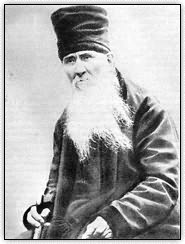A Christian is called to leave everything and follow Christ in poverty of spirit, becoming free of the sinful desires of this world. According to the world of the Apostle John the Theologian:
If any man love the world, the love of the Father is not in him. For all that is in the world, the lust of the flesh, and the lust of the eyes, and the pride of life, is not of the Father, but is of the world. And the world passeth away, and the lust thereof: but he that doth the will of God abideth for ever (I John 2:15-17).
The holy Fathers of the Church wrote very much about humility, considering that a correct spiritual life needs this virtue more than all else. Saint Isaac the Syrian, for example, writes:
The truly righteous always think within themselves that they are unworthy of God; it is known that they are truly righteous by the fact that they consider themselves wretched and unworthy of God's care, and they confess this secretly and openly and they grow wiser by this through the Holy Spirit - in order to remain in labor and straitness while they are still found in this life. (Christian Life According to the Philocalia)
Who can understand this? How can a man standing close to God consider himself to be sinful, unworthy of God's care, the least of men? The answer we find in the life of the holy Abba Dorotheus:
I remember once we had a conversation about humility, and one of the notable citizens of the city was amazed on hearing our words that the nearer one draws to God, the more he sees himself to be a sinner, and he said: How can this be? And not understanding, he wished to find out what these words mean?
I said to him: O notable Citizen, tell me, how dost thou regard thyself in thine own city?
He answered: I regard myself as great and as first in the city.
I say to him: If thou shouldst go to Caesarea, how wouldst thou regard thyself there?
He answered: As the least of the grandees there.
And if, I say to him again: thou shouldst travel to Antioch, how wouldst thou regard thyself there?
There, he answered: I would consider myself as one of the common people.
And if, I say: thou shouldst go to Constantinople and approach the Emperor, how wouldst thou begin to regard thyself there?
And he answered: Almost as nothing.
Then I answered him: So it is also with the saints: the nearer they draw to God, the more they see themselves to be sinners.
An ancient patericon (a collection of short stories about strugglers for piety) says:

The clearer the water, the more noticeable are the smallest specks in it. When a ray of the sunlight falls on a room, it enables the eye to see myriad dust particles borne in the air, which, until the penetration of the ray, were not noticeable. So also with the human soul: The more purity in her, the more heavenly, divine light falls on her, and the more does the soul notice imperfections and sinful habits in herself.
The higher a man is morally, the more humble he is, and the more clear and constant is his consciousness of his sin.
 lain to any one that he will. Yet not on account of the weakness of the weapons, but on account of the unskillfulness of the man who knows not how to use them well.
lain to any one that he will. Yet not on account of the weakness of the weapons, but on account of the unskillfulness of the man who knows not how to use them well. ission of faith? Nicodemus heard of the spiritual Birth, yet perceived it not as spiritual, but dragged down the words to the lowness of the flesh, and made a doctrine so great and high depend upon physical consequence. And so he invents frivolities, and ridiculous difficulties.
ission of faith? Nicodemus heard of the spiritual Birth, yet perceived it not as spiritual, but dragged down the words to the lowness of the flesh, and made a doctrine so great and high depend upon physical consequence. And so he invents frivolities, and ridiculous difficulties. ther, and its yearly confessional which is often hypocritical, only increases its patches rather than rejuvenating it. The body demands various forms of diversions and gratifications; it frequently ravages whole families, for its sake people sometimes are willing to exert all types of efforts while the soul - has barely one hour on Sundays to partake in the Divine Liturgy, scarcely minutes for morning and evening prayers, reluctantly collects a handful of copper coins for charity and when thinking about death, expresses its satisfaction with a cold sigh. For the sake of health and welfare of the body, the atmosphere and habitat is substituted, foremost and distant physicians are summoned, there is abstinence from food and drink, the most bitter medicines are consumed, the body is allowed to be burned and dissected, yet for the health of the soul, for the avoidance of temptations, for distancing away from sinful infection, they take not one step but remain in the same atmosphere, in the same iniquitous society, in the same corrupt house, not seeking any spiritual physician, or else selecting one that is unfamiliar and inexperienced, hiding from him that which is already known to Heaven and hell, and about which they themselves boast among their circles. When the body is dying, you hear lamentations and despair, but often no thought is given when the soul is dying from mortal sin.
ther, and its yearly confessional which is often hypocritical, only increases its patches rather than rejuvenating it. The body demands various forms of diversions and gratifications; it frequently ravages whole families, for its sake people sometimes are willing to exert all types of efforts while the soul - has barely one hour on Sundays to partake in the Divine Liturgy, scarcely minutes for morning and evening prayers, reluctantly collects a handful of copper coins for charity and when thinking about death, expresses its satisfaction with a cold sigh. For the sake of health and welfare of the body, the atmosphere and habitat is substituted, foremost and distant physicians are summoned, there is abstinence from food and drink, the most bitter medicines are consumed, the body is allowed to be burned and dissected, yet for the health of the soul, for the avoidance of temptations, for distancing away from sinful infection, they take not one step but remain in the same atmosphere, in the same iniquitous society, in the same corrupt house, not seeking any spiritual physician, or else selecting one that is unfamiliar and inexperienced, hiding from him that which is already known to Heaven and hell, and about which they themselves boast among their circles. When the body is dying, you hear lamentations and despair, but often no thought is given when the soul is dying from mortal sin.